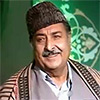
Ustad Sarahang is perhaps the greatest Master of Eastern classical music; a Master not respected in Afghanistan, but even more revered in Pakistan and India, where Eastern classical music has been the way of life.
Ustad Sarahang was born in 1924 as Mohammad Hussain, the second oldest son of the renowned musician, Ustad Gholam Hussain. Mohammad Hussain was born and raised in Kharabat (old Kabul), a city famous and conceivably notorious for its musicians.
According to Afghanland.com, At an early age, Mohammad Hussain began taking music lessons from his father while attending school. Within a short period of time, Mohammad Hussain mastered the theory of classical music and showed a keen interest for more knowledge. His proud father sent his teenage son to “Patyala” School of Music in then British occupied India to be a pupil under Ustad Ashiq Ali Khan “The Light of Punjab.”
“A loving environment at home might have a negative effect on the progress of his [Mohammad Hussain] ability to take music seriously; a person becomes a great Ustad when he accepts and welcomes temperament, physical and mental punishment while earning the respect of his Master.”
Mohammad Hussain, after 16 years of service and learning, returned to his beloved Kabul. At the age of 25, Mohammad Hussain participated in a festival of music held at Kabul’s famed Pamir Cinema. Amongst the participants were Ustad Qasim and Ustad Bada Gholam Ali. At this festival, Mohammad Hussain amazed the crowd with his talent and passion and was awarded the Gold Medal over the more famous Masters of music. His performance at this festival earned Mohammad Hussain the title of Ustad Mohammad Hussain and a few years later, the government of Afghanistan awarded him the title of “Sarhanag.”
Ustad Sarahang had ascended amongst the ranks of afghan musicians and was without doubt the undisputed Master of music. With invitations to music conferences in USSR, Pakistan and India, Ustad Sarahang found an international fan base. At every conference or competition abroad, Ustad Sarahang brought home medals, awards and titles, which made Afghan musicians and music lovers in Afghanistan proud of their Son.
In Afghanistan, Ustad sarahang worked hard to educate the public about classical music, which originated in Afghanistan centuries ago by Nasir Khesrow. Ustad sarahang wrote many articles in Pashtun Ghag newspaper, he wrote a book titled “Qanon e Tarab” explaining the rules of eastern music. He and Maddadi hosted 2 nightly informative radio programs entitled “De Ahangoono Mahfil” comprised of poetry reading and ghazal songs and “Mosiqi Kilasik” introducing classical raags to the public.
Ustad preferred the poetry of Abdul Qader Baydel, the complicated yet elegant poet of the Moghol dynasty. Ustad Sarahang was a member of the elite group of “Baydel Shenasan” who discussed and interpreted the verses of Baydel’s poetry in gatherings at local teahouses. Amongst these circles of thinkers was Qandi Agha who had the most influence and was a great friend of Ustad Sarahang.
In India, Ustad Sarahang was an idol to be worshipped. During his last trip to Allahabad School of Music, in order to show respect for the great Ustad Sarahang, Indian female Ustads and students of the school lined up and bowed their heads furnishing the path to the stage with their hair so that Ustad Sarahang could walk over them.
Ustad Sarahang’s accomplishments include:
- Title of “Koh e Beland” (High Mountain of Music) from Chandigar School of Music
- Degrees of “Master” “Doctors” and “Professor” of Music from Klakandra School of Music in Calcutta India
- Title of “Sar Taj” (Top Crown of Music) from Central School of Music in Allahabad India
- Title of “Baba e Musiqi” (The Father of Music) at conclusion of his final concert in New Delhi India 1979
- Title of “Sher e Musiqi” (Lion of Music) at the conclusion of his last performance in Allahabad 1982
His medal count reached 20, a status earned by fewer than a handful of musicians in the world, and by far the youngest musician to earn so many titles and medals.
Ustad Sarahang once said that if he were to die in India, he was to be buried next to the tomb of Baydel, but if he were to die in Afghanistan, he requested to be buried in Kharabat. Upon his last trip to India in 1982, Ustad Sarahang fell gravely ill and was hospitalized and ordered not to sing and to keep his talking to a minimum. But Ustad Sarahang disregarded the orders of his doctors and continued his performance which earned him yet another medal and with it the pride to the people of Afghanistan.
Ustad Sarahang seemed weak and ill upon his return to Afghanistan, but he continued to write and teach music. In 1983, Ustad Sarahang suffered yet another heart attack that hospitalized him. Growing ever weaker, Ustad Sarahang passed away on a clear Saturday morning in April of that year.
Ustad Sarahang's Albums
